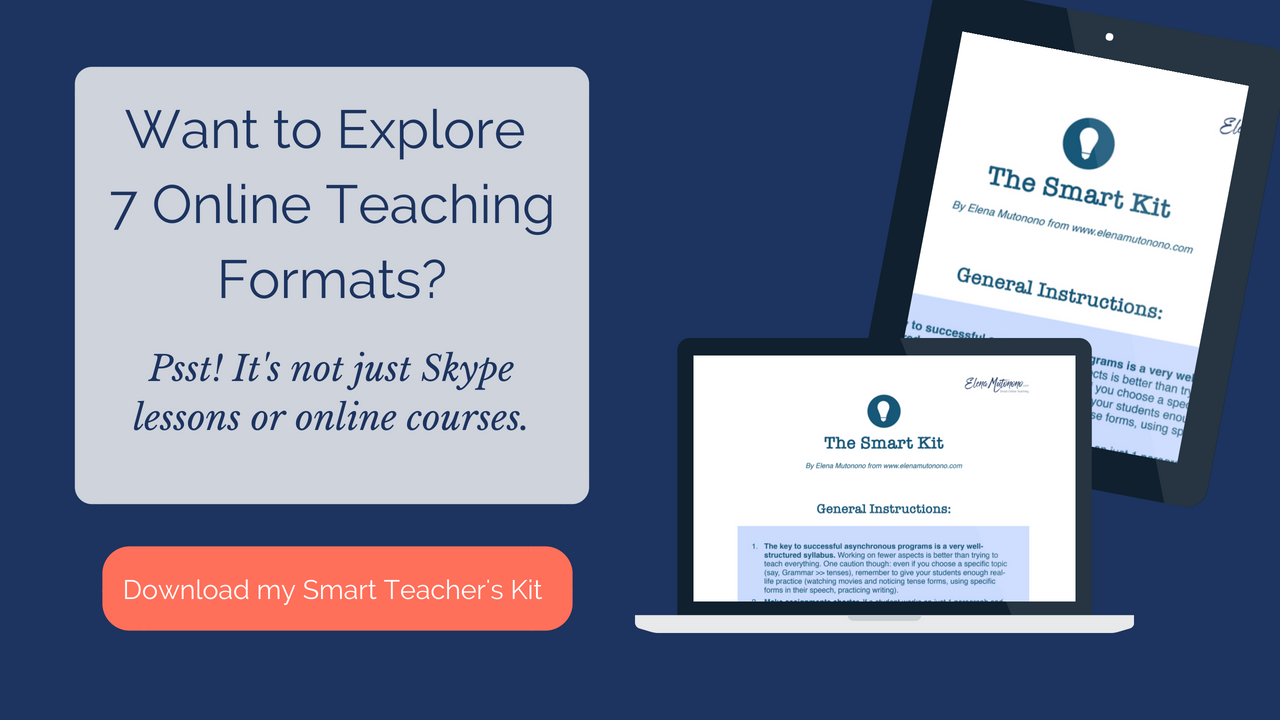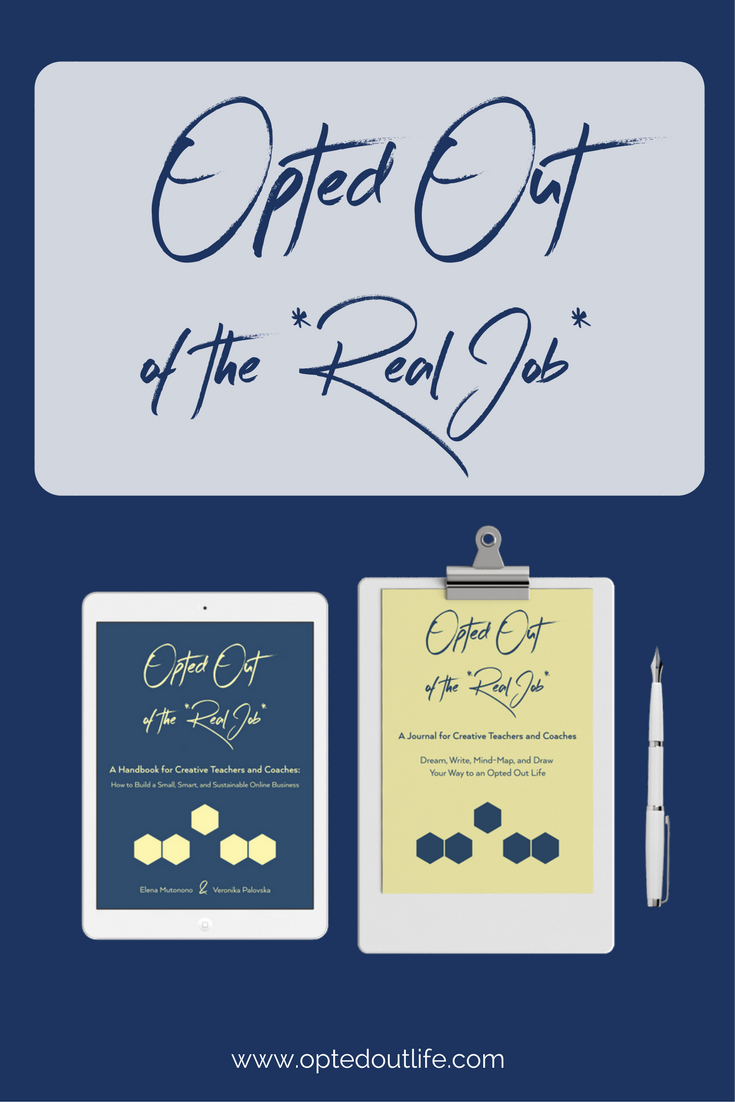For the guest post today I’ve asked Veronika Palovska to write about lazy phrases teachers use on their websites.
When I was little I used to hate writing greeting cards. Why? Because everyone would write the same-old things every time. I remember thinking once what it would be like if I broke the rules and wrote something completely different. I guess that was my first introduction to copy writing.
Surprisingly, when I wrote the copy for my first website, I never thought to be different. I wrote a bunch of lazy phrases despite the fact that it hardly made me stand out.
The idea for today’s post came to me a few months ago when I attended a 2-day event for creative entrepreneurs in New Orleans. I asked myself, wouldn’t it be cool if there was a list of lazy phrases that we, online teachers, abuse all the time? I shared this crazy thought with Veronika Palovska from DoYouSpeakFreedom.com, and she wrote this brilliant post. Enjoy! ~ Elena.
Veronika Palovska’s post How to Use Blogs To Help Your Students Achieve Fluency received Featured Blog of the Month award in September 2016 from Teaching English British Council.
The post was updated in March, 2021.
I love hanging out with teachers, both online and offline.
Teachers, at least the teachers I know, are the best companions ever. Here’s why:
They’re smart. They read, learn, and seek knowledge every day.
They’re fun. They know how to tell stories, engage their audience, and entertain without being annoying or boring.
They’re creative and original. They aren’t afraid to explore new paths, break the rules, and look at mundane things from unexpected perspectives.
They’re passionate. You’ll never hear a teacher say “If I won the lottery, I wouldn’t work another day of my life.” They love what they do.
They’re bold. They’re the first ones to raise their voice against injustice, and they take action when others want to quit. Not because it comes easy to them, but because they stubbornly insist on making the world a better place.
The Internet gives you a bullhorn to get your ideas out there. Don’t throw it away
Both as a part of my job and out of curiosity, I spend a lot of time looking at online teachers’ websites. And I often wonder what happens to those smart, fun, and brave human beings when they put fingers to keyboard to write copy for their website.
I mean, teacherpreneurs are the most colorful and diversive bunch of creative entrepreneurs, but it sometimes seems that they write their websites using carbonless copy paper. I’m speaking about the industry clichés that are everywhere.
Don’t get me wrong. I’m not saying that you’re a bad writer or a bad person if your website copy includes any of the phrases I’m going to speak about today. And yes, I admit that I’ve also used many of them at some point. Of course I have. It’s a default option.
Clichés are the first words that pop up in your head when you’re trying to express your idea – and there’s little you can do about it. Your task is to spot them and weed them out before you hit publish.
You simply can’t afford to build your copy out of clichés. Lazy expressions ruin your brand, cost you money, and weaken your voice. And the world needs to hear you.
The 3 phrases we all need to stop using today
Let’s start right now by getting rid of three of the most overused phrases. Here’s what all of them have in common:
- They are generic, so they are meaningless.
- They are overused, so they are forgettable.
- They don’t arouse emotions.
- They don’t inspire action.
- They are boring.
- They dehumanize your writing.
What I want you to do is look at your website, see how many of these expressions you can find there, and replace them by specific, memorable, and action-inducing words that talk directly to your clients. After you finish, you’ll have an advantage over all the people who still think that they can get away with lazy, generic, and boring copywriting.
But this is just the beginning. These three phrases aren’t the only clichés teachers use, and clichés aren’t the only things that prevent your website from doing its job – attracting paying clients.
If you want to continue detoxicating your website copy after you finish with today’s tasks, join my five-day challenge for teacherpreneurs.
But first, here are the top three clichés we need to stop using today.
1. Take your English to the next level
I knew it. You have this exact sentence, or its alternative, somewhere on your website, don’t you?
It’s not so hard to guess; this is the most overused cliché in our industry. When you google the expression, you get 297,000,000 results.
Now, think about it for a moment. What’s your chance of getting heard among 300 million voices?
And what does this popular phrase even mean? What is the next level? How do you know you are there? And what’s wrong with this level?
Can you explain it? If you can, do it now, and replace the “next level” phrase by your explanation. If you can’t, let’s try this simple exercise:
Imagine one of your students, someone you loved working with, someone who got amazing results from your work. Got it? Now, try to remember her situation when she approached you for the first time. How did she describe her problem? If you archive your email correspondence, reread her first emails.
Imagine her initial situation, with all the details – her pain, her frustration. This is “point A” of her journey.
And now, think about her after she worked with you. How was her situation different and better than before? This is “point B.”
Well, now you have a better way of talking about your student’s journey – from point A to point B. From not being able to order a cup of coffee in a restaurant to blending in with native speakers. From hiding at networking events to confidently approaching strangers. From feeling desperate about her job to a new dream career.
Doesn’t that sound better than taking their skills to the next level?
2. Lessons are tailored to your needs
Is this really the best thing you can say about your service?
If you’re using this phrase, you teach one-on-one Skype lessons, like the majority of people who teach online. Now, if it’s just the two of you – you and the student – how can the lessons not be tailored? And how does “tailoring the lessons” make you different or better than all the other teachers who also tailor their lessons to everyone’s needs?
But this isn’t the only problem with this phrase. Another thing is that it talks about the process, not the result. And people don’t buy the process, they buy the result:
Let’s say you live in London, and you want to go Prague. You’d prefer to travel by plane rather than by train. But you don’t google “traveling by plane”; you google “London to Prague.” Then you choose the results that talk about flight tickets, not train tickets.
This is a mistake I see a lot. Showing potential students what’s inside is important, but it shouldn’t be the first and only thing you tell them – even if you do it in a better (read: more specific) way than using a meaningless phrase, like the one about tailoring the lessons to their needs.
Here’s what to do instead: Start with your student’s problem. Describe their starting position, their “point A” from the previous exercise (or their “London”), so that they know that you know where they are and you understand their struggle. Now that you have their attention, you can let them peek into your process.
But don’t say that you’re going to tailor the lessons to their needs. Tell them, or rather, show them how you’re going to work together, so that they can envision what they’re buying.
Here’s what I mean:
Compare – “Lessons are tailored to your needs.” And – “I’ll prepare a personalized syllabus for one month with weekly homework assignments – listening and speaking exercises from your area of expertise – and we will meet once a week for one hour to practice conversation”. Which one would you choose?
3. I’ll help you achieve your goals
Once again, this statement is meaningless.
My goal may be to quit my job, move to Bali, lie on a beach, and drink cocktails while money miraculously appear on my bank account. Can you help me achieve it? Please?
But seriously, “achieving goals” doesn’t mean anything unless you specify what those goals are. Again, we are talking about the result – the “point B” (or the “Prague”) of your student’s journey. That’s what they are buying.
And it’s not enough to tell potential students that they will achieve an intermediate level or fluency. That’s too abstract.
To come up with a more attractive offer, ask yourself: How does achieving this goal look like in practice? What are the students able to do after they work with me?
If you have a well-defined niche and if you sell packages, not time, it’s easier to make the goals SMART: specific, measurable, achievable, relevant, and time bound. This way, you can offer (and actually deliver) transformational results to a specific group of people, as opposed to average results to everyone.
This kind of an offer makes competition irrelevant, because once your ideal client finds you, you will be an obvious choice.
But even if you aren’t there yet, what you can do right now is to replace the phrase “I’ll help you achieve your goals” by a vivid picture of what your student’s life will look like after she works with you: “Do you feel miserable at work? I’ll help you nail your next job interview so you can finally get your dream job and stop living just for the weekends and vacations.”
See?
This is just the beginning
Pssst. If you enjoyed today’s post and are wondering if there are more things on your website that maybe aren’t serving you, join my free 5-day mini-challenge, The Copy Detox for Teacherpreneurs.



 Welcome to my nook where *Big Magic* happens. My name is Elena Mutonono, I help small business owners package their services as digital products and sell them online. I want you to work smarter, not harder. Increase your impact beyond your current face-to-face clients. Grow your business as you reach more people all over the world.
Welcome to my nook where *Big Magic* happens. My name is Elena Mutonono, I help small business owners package their services as digital products and sell them online. I want you to work smarter, not harder. Increase your impact beyond your current face-to-face clients. Grow your business as you reach more people all over the world.








Great Job !!! I’m really love your ideas and find it creative and useful for teachers . thanx
Thank you! Glad you enjoyed it 🙂
Great post! There are so many of the same expressions that I’ve seen being used time and time again. Perhaps it’s a lack of imagination I suppose. I’m finding myself at a loss for words at times and after reading this article, I’ve come up with this. “Do you love to travel, but wish you knew more English? I’ll help you feel more confident in your speaking skills so you can feel more at ease.” Now I know this still feels a bit bland and needs more tweaking, what do you think?
I just signed up for your email list, so I look forward to reading more from you.
Thank you!
Dan, it’s a beginning – keep working on it! I know I’m biased, but if you feel at a loss for words, I highly recommend Veronika’s coaching program (although you would have to apply). Veronika has helped me and a number of my coaching clients find their unique voice when they write their website copy. As you may have noticed, it’s not so easy. You have to be clear on your niche and on your ideal client, that’s when your copy becomes truly unique. Until you write to “all the people out there” the copy is going to sound cliche, I’m afraid. That’s what it was like for me when I first started teaching online and had my first website. Finally, don’t forget to sign up for Veronika’s free 5-day copy detox challenge (HIGHLY recommended). The worksheets and the explanations are clear and to the point, and you can apply them right away. Good luck!
This is such a useful post, thank you so much! I am busy rewriting my website copy at the moment and two of those phrases are on there for sure. I suppose they key is to put yourself out there, be who you are and make your message memorable which is quite scary. On the other hand, you see all of these words and phrases on other websites and think, well they must be working…. I am trying to be unique, I do have ideas, it’s just trying to narrow down, be yourself and promote yourself. Thanks again for such great advice.
Luisa, I’m looking forward to working with you and helping you find something that makes you unique. The reason all websites in our industry look the same is because we (as teachers turned entrepreneurs) know little about modern marketing, specifically human marketing that sells meaning first, and makes money second. I believe in the future the only people who will make a considerable difference are those who aren’t afraid to stand out. I’m glad that you’ve enrolled on this journey.